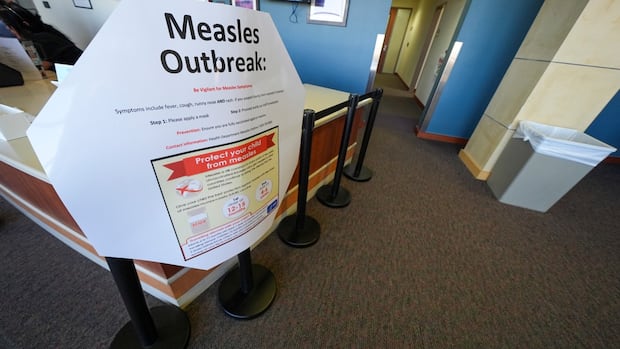Rare Measles Complications: A Growing Concern
Editor's Note: The recent resurgence of measles cases highlights a critical concern: the rise in rare but serious complications. This article explores these complications and the importance of vaccination.
1. Why This Topic Matters
Measles, a highly contagious virus, is preventable through vaccination. However, a concerning trend shows a rise in cases, particularly among unvaccinated populations. This resurgence isn't just about the typical measles symptoms; it's about the significant risk of rare but potentially devastating complications. Understanding these complications is crucial for public health initiatives and individual decision-making regarding vaccination. We will examine specific complications like encephalitis, pneumonia, and subacute sclerosing panencephalitis (SSPE), exploring their severity, likelihood, and long-term effects. The information presented will emphasize the critical role of vaccination in mitigating these risks.
2. Key Takeaways
| Complication | Severity | Likelihood (relative) | Long-Term Effects |
|---|---|---|---|
| Encephalitis | Very Serious | Moderate | Neurological damage, seizures, death |
| Pneumonia | Serious | High | Respiratory distress, lung damage |
| Subacute Sclerosing Panencephalitis (SSPE) | Extremely Serious | Low | Progressive brain damage, death |
| Otitis Media (Ear Infection) | Moderate | High | Hearing loss, temporary deafness |
3. Main Content
3.1 Rare Measles Complications
Introduction: While most measles cases resolve with typical symptoms (fever, rash, cough), a significant minority experience severe complications. These complications can arise from the virus itself or from secondary infections.
Key Aspects: The most concerning complications include encephalitis (brain inflammation), pneumonia (lung infection), and SSPE (a rare but fatal brain disease). Other complications, though less severe, can include diarrhea, dehydration, and otitis media (ear infection).
Detailed Analysis:
-
Encephalitis: This inflammation of the brain can cause seizures, coma, and permanent brain damage. While relatively uncommon (occurring in about 1 in 1,000 cases), it's a serious threat.
-
Pneumonia: Measles weakens the immune system, making individuals susceptible to bacterial pneumonia, a leading cause of death in measles patients, especially young children and immunocompromised individuals.
-
SSPE: This extremely rare but devastating complication occurs years after a measles infection. It's a progressive neurological disorder leading to severe brain damage and death. The exact mechanism isn't fully understood, but it's believed to involve the persistence of the measles virus in the brain.
-
Other Complications: Otitis media (ear infection), diarrhea, and dehydration can also occur, often requiring hospitalization, especially in young children.
3.2 Interactive Elements on Measles Complications
Introduction: Understanding the interactive nature of measles complications is essential. The severity of complications is often influenced by factors like age, underlying health conditions, and access to quality healthcare.
Facets: Several factors interact to determine the likelihood and severity of complications. These include:
- Age: Infants and young children are at higher risk of severe complications.
- Immune Status: Individuals with weakened immune systems are more vulnerable.
- Access to Healthcare: Prompt diagnosis and treatment are crucial for mitigating complications.
Summary: The interplay of these factors highlights the importance of preventative measures, especially vaccination, to minimize the risk of severe complications.
3.3 Advanced Insights on Measles Complications
Introduction: Research is ongoing to better understand the mechanisms behind these rare complications and develop effective preventative strategies.
Further Analysis: Studies are exploring the genetic factors that may influence susceptibility to severe complications. Researchers are also investigating new therapeutic approaches to treat these complications. Public health experts emphasize the critical role of high vaccination rates in preventing the spread of measles and the occurrence of serious complications.
4. People Also Ask (NLP-Friendly Answers)
Q1: What is measles? A: Measles is a highly contagious viral infection characterized by fever, cough, runny nose, and a distinctive rash.
Q2: Why is measles vaccination important? A: Measles vaccination is crucial to prevent infection and the risk of serious complications like encephalitis, pneumonia, and SSPE.
Q3: How can measles vaccination benefit me? A: Measles vaccination protects you from infection and significantly reduces your risk of experiencing serious health consequences.
Q4: What are the main challenges with measles outbreaks? A: Challenges include low vaccination rates, misinformation about vaccines, and difficulties in controlling outbreaks in densely populated areas.
Q5: How to get started with measles protection? A: Talk to your doctor about getting vaccinated. The MMR (measles, mumps, rubella) vaccine is highly effective and safe.
5. Practical Tips for Measles Prevention
Introduction: Staying protected from measles requires proactive steps.
Tips:
- Get vaccinated with the MMR vaccine.
- Practice good hygiene (frequent handwashing).
- Avoid contact with infected individuals.
- Consult your doctor if you suspect measles infection.
- Stay informed about measles outbreaks in your area.
- Advocate for vaccination in your community.
Summary: Following these simple tips significantly reduces your risk of contracting measles and experiencing its potential complications.
6. Summary
The resurgence of measles highlights the importance of vaccination in preventing severe complications. Encephalitis, pneumonia, and SSPE are rare but potentially life-threatening outcomes. High vaccination rates remain the most effective strategy for protecting individuals and communities from the devastating effects of measles.
7. Call to Action (CTA)
Ready to protect yourself and your loved ones? Talk to your doctor about getting the MMR vaccine today!

